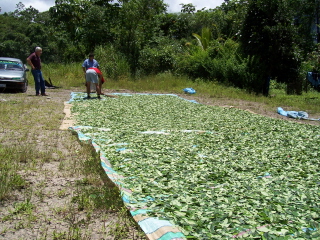 [Brazil] — Brazil strengthens state control over offshore oil reserves — Xinhua
[Brazil] — Brazil strengthens state control over offshore oil reserves — Xinhua
Brazil announced on Monday new oil exploration rules to increase state control over its recently discovered offshore oil reserves.
Under the plan, the state-owned oil and gas giant Petrobras will be the sole operator of the new oil reserves. It will also have a minimum 30-percent stake in all future projects in the pre-salt layer fields.
Brazil Tries to Maximize Offshore Oil Bonanza— Latin America Herald Tribine
Brazilian President Lula revealed the government’s plans to make Brazil one of the top 10 oil producers in the world and develop what he believes are the world’s 9th largest oil reserves, but his announcement of increased state control and further equity sales shook markets, causing Petrobras to lose $7 billion in value in one day.
Petrobras Loses $7 Billion Value as Lula Seeks Stake — Bloomberg
Brazilian President Luiz Inacio Lula da Silva’s plans for the development of the country’s offshore oil fields stripped Petroleo Brasileiro SA investors of $7 billion in a day.
The proposal, announced yesterday, may allow the state to boost its stake in the company and ensure most income from oil exploration “stays in the hands of our people,” Lula said at a press conference in Brasilia. Petrobras, as the Rio de Janeiro- based company is known, led the Bovespa stock index to the biggest drop in the Americas yesterday after the announcement.
[Venezuela] — Chavez Says Venezuela Will Continue Oil Exports to U.S. — Latin America Herald Tribine
Venezuelan President Hugo Chavez said that his country will continue exporting oil to the United States because it is in the Andean nation’s interest.
Chavez said in a statement published in the Lima daily El Comercio that “many people don’t know” that Venezuelan state oil giant PDVSA, through its Citgo subsidiary, has seven large refineries and more than 10,000 service stations on U.S. soil.
“Venezuela can’t take a decision against ourselves. We send the oil to our refineries and to our distribution systems in the United States,” he said.
Caracas Stock Market Up 3% for the Week — Up 41% for the Year — Latin America Herald Tribine
The Caracas Stock Index rose 3.16% for the week to close at 49,507 mostly on the back on the continued rise of Sivensa shares on continued optimism over the buyback of its shares to be considered at its shareholders meeting next week. Sivensa shares rose sharply, closing at Bs. 16.5 for a 37.5% rise.
[Peru] — Two Wounded in Rebel Attack, Peruvian TV Reports — Latin American Herald Tribine
At least two soldiers were wounded in an attack apparently mounted by Shining Path guerrillas Monday against a counterinsurgency base in central Peru’s Junin province, Canal N television reported.
The guerrillas opened fire around 3:30 a.m. on the Jose Olaya base in the strife-torn Valley of the Apurimac and Ene rivers, known as the VRAE region, Canal N said.
[Bolivia] — Morales Named “World Hero of Mother Earth” by UN General Assembly— Latin America Herald Tribine
The president of the United Nations General Assembly, Rev. Miguel D’Escoto Brockmann, on Saturday declared Bolivian President Evo Morales as “World Hero of Mother Earth” in a ceremony at the presidential palace in this capital.
With a medal and a parchment scroll, the General Assembly of the United Nations Organization named Morales “the maximum exponent and paradigm of love for Mother Earth” in the resolution for his decoration that was read during the ceremony.
Bolivia Cries Foul Over Peru Plans for Drilling in Titicaca — Latin America Herald Tribine
Bolivian President Evo Morales’ government will present a formal complaint to Peru over its plans to drill for oil in Lake Titicaca without consulting La Paz, state-run news agency ABI reported.
Hydrocarbons Minister Oscar Coca sent Bolivia’s Foreign Ministry a note requesting that a formal complaint be made since the body of water straddles the border between the two nations, ABI said.
“Since Lake Titicaca is a bi-national area, it’s obvious that there can’t be unilateral actions” and therefore the matter requires a diplomatic solution, Coca said.
[Cuba] — Cuba endeavors to raise farm output amid economic downturn — Xinhua
Pressured by a global economic crisis and a stern U.S. economic blockade that has lasted nearly half a century, Cuba is actively seeking ways to boost its agricultural production.
The measures include turning over land close to cities to residents to plow, replacing fuel-burning tractors with oxen, redistributing fallow land and raising the prices of state-regulated farm products.

Read Full Post »

![amazon-river-landreport Amazon River [Img: LandReport.com]](https://chinasouthamerica.files.wordpress.com/2009/10/amazon-river-landreport.jpg?w=500)



